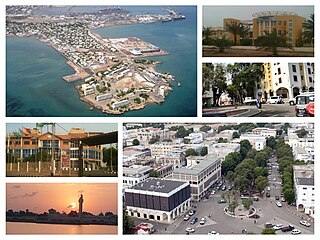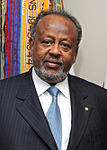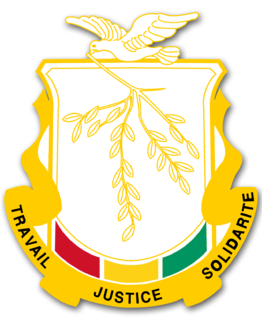
Guinea elects on the national level a head of state—the president—and a legislature. The president is elected for a five-year term by the people through a two-round system. The National Assembly has 114 members, elected for five-year terms, 38 members in single-seat constituencies and 76 members by proportional representation.
Aden Robleh Awaleh is a Djiboutian politician and President of the National Democratic Party (PND). He is currently a member of the National Assembly of Djibouti.
Ahmed Mohamed Hassan is a Djiboutian politician. He is a member of the People's Rally for Progress (RPP) and has served in the National Assembly of Djibouti as well as the Pan-African Parliament.

The unicameral National Assembly is Benin's legislative body.

A parliamentary election was held in Guinea on 30 June 2002 after several postponements, over two years after it was originally scheduled to be held. It was won by President Lansana Conté's Unity and Progress Party, which won 61.57% of the vote and 85 of the 114 seats.

A parliamentary election was held in Djibouti on 8 February 2008. There were 65 candidates running for the 65 seats in the National Assembly, with all of the candidates coming from the ruling coalition, the Union for the Presidential Majority (UMP). The opposition boycotted the election, and the UMP won all 65 seats.
Mohamed Dini Farah is a Djiboutian politician. He is a former minister and President of the Parliamentary Group of the People's Rally for Progress (RPP), currently serving as a deputy in the National Assembly of Djibouti.
Ahmed Boulaleh Barreh, also known as Gabayo, is a Djiboutian politician. He is the Vice-President of the People's Social Democratic Party (PPSD) and a member of the National Assembly of Djibouti.

Claudine Munari Mabondzo is a Congolese politician. She was Director of the Cabinet of President Pascal Lissouba from 1992 to 1997. Although Munari fled into exile when Lissouba was ousted, she later returned to politics in Congo-Brazzaville; she was a Deputy in the National Assembly from 2002 to 2009 and was also the Second Secretary of the National Assembly from 2007 to 2009. From 2009 to 2015, she served in the government as Minister of Trade.
Bernard Tchibambelela is a Congolese politician who served in the government of Congo-Brazzaville as Minister of Fishing and Aquaculture from 2012 to 2016. A member of the Congolese Movement for Democracy and Integral Development (MCDDI), he was First Vice-President of the National Assembly of Congo-Brazzaville for a brief period in 1992, and he was Second Vice-President of the National Assembly from 2007 to 2012.
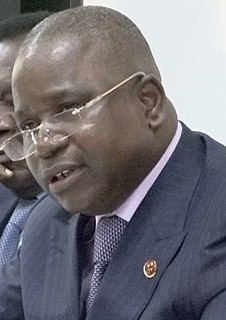
Pierre Ngolo is a Congolese politician who has been Secretary-General of the Congolese Labour Party (PCT) since August 2011. He was First Secretary of the National Assembly of Congo-Brazzaville from 2002 to 2012.
Daniel Ona Ondo is a Gabonese politician who has been Prime Minister of Gabon from January 2014 to September 2016. He previously served as Minister of Education and First Vice-President of the National Assembly. He is a member of the Gabonese Democratic Party.

The 2003 Djiboutian parliamentary election took place in Djibouti on 10 January 2003 to elect the National Assembly of Djibouti. The ruling coalition of President Ismail Omar Guelleh won all 65 seats in the election defeating an opposition coalition.

Parliamentary elections were held in the Republic of the Congo on 15 July 2012. A second round was held on 5 August 2012. The second round was previously moved forward to 29 July, without explanation, but ultimately was held on the original date.
René-Dambert Ndouane is a Congolese politician who served in the government of Congo-Brazzaville as Minister of Tourism from 1997 to 1999 and as Minister of Labour from 1999 to 2002. He was Second Vice-President of the National Assembly from 2002 to 2007 and First Vice-President of the National Assembly from 2012 to 2017.

General elections were held in Niger on 21 February 2016, with a presidential run-off held on 20 March. A total of 15 candidates ran for the presidency, with incumbent President Mahamadou Issoufou running for re-election for a second term. There were two main opposition candidates also vying for the top post, Seyni Oumarou of the MNSD, who lost to Issoufou in 2011, and Hama Amadou of MODEN/FA, who has been campaigning from prison since November 2015. Most of the opposition agreed to align for the second round to back the second-placed candidate against Issoufou.
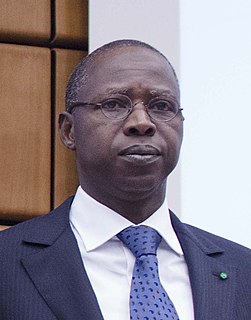
Parliamentary elections were held in Senegal on 30 July 2017, having originally been planned for 2 July.
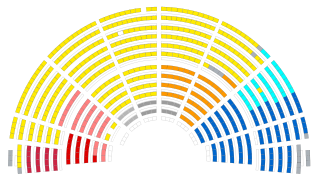
The 15th legislature of the French Fifth Republic is a parliamentary cycle that commenced on 21 June 2017 following the legislative elections on 11 and 18 June 2017. The party of the president Emmanuel Macron, La République En Marche! (REM), obtained an absolute majority of 308 deputies, alongside its ally, the Democratic Movement (MoDem), which secured 42 seats. The new deputies elected François de Rugy the President of the National Assembly when it first convened on 27 June. The legislative elections saw a record level of renewal, with only a quarter of deputies elected in 2012 also elected in 2017, and a significant increase in the representation of women and youth. With 7 planned parliamentary groups, it would be the most fragmented assembly since 1958.

Parliamentary elections were held in Djibouti on 23 February 2018. The election was boycotted by the main opposition parties, including some of the parties in the Union for National Salvation coalition, which had won 10 seats in the previous elections in 2013.


